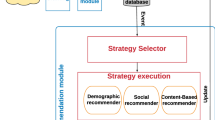Abstract
Collaborator finding systems are a special type of expert finding models. There is a long-lasting challenge for research in the collaborator recommending research area, which is the lack of the structured dataset to be used by the researchers. We introduce two datasets to fill this gap. The first dataset is prepared for designing a consistent, collaborator finding system. The next one, called a co-author finding model, models an academic social network as a table that contains different relations between the pair of users. Both of them provide an opportunity for introducing potential collaborators to each other. These two models have been extracted from ResearchGate (RG) data set and are available publicly. RG dataset has been collected from Jan. 2019 to April 2019 and includes raw data of 3980 RG users. The dataset consists of almost complete information about users. In the preprocessing phase, the well-known Elmo was used for analyzing textual data. We call this as ResearchGate dataset for Recommending Systems (RGRS). For assessing the validity of data, we analyze each layer of data separately, and the results are reported. After preparing data and evaluating the collaborator finding models, we have done some assessments on RGRS. Some of these assessments are co-author, following-follower, and question answering relations. The outcomes indicate that it is the best relation in propagating knowledge in the network. To the best of our knowledge, there is no processed and analyzed dataset of this size.




Similar content being viewed by others
Notes
References
Anongnart S (2012) Building fexpert: system for searching experts in research university using k-means algorithms. In: 2012 IEEE symposium on computers & informatics (ISCI). IEEE, pp 176–179
Cai D, Shao Z, He X, Yan X, Han J (2005) Mining hidden community in heterogeneous social networks. In: Proceedings of the 3rd international workshop on Link discovery, pp 58–65
Davoodi E, Afsharchi M, Kianmehr K (2012) A social network-based approach to expert recommendation system. In: International conference on hybrid artificial intelligence systems. Springer, pp 91–102
Gollapalli SD, Mitra P, Giles CL (2012) Similar researcher search in academic environments. In: Proceedings of the 12th ACM/IEEE-CS joint conference on digital libraries, pp 167–170
Hoang DT, Tran VC, Nguyen TT, Nguyen NT, Hwang D (2017) A consensus-based method to enhance a recommendation system for research collaboration. In: Asian conference on intelligent information and database systems. Springer, pp 170–180
Huynh T, Takasu A, Masada T, Hoang K (2014) Collaborator recommendation for isolated researchers. In: 2014 28th international conference on advanced information networking and applications workshops. IEEE, pp 639–644
Jutla IS, Jeub LG, Mucha PJ (2011) A generalized louvain method for community detection implemented in matlab. http://netwiki.amath.unc.edu/GenLouvain
Kong X, Jiang H, Yang Z, Xu Z, Xia F, Tolba A (2016) Exploiting publication contents and collaboration networks for collaborator recommendation. PloS one 11(2):e0148492
Li N, Gillet D (2013) Identifying influential scholars in academic social media platforms, pp 608–614
Liang W, Zhou X, Huang S, Hu C, Xu X, Jin Q (2018) Modeling of cross-disciplinary collaboration for potential field discovery and recommendation based on scholarly big data. Future generation computer systems 87:591–600
Peters ME, Neumann M, Iyyer M, Gardner M, Clark C, Lee K, Zettlemoyer L (2018) Deep contextualized word representations. arXiv:1802.05365
Rani SK, Raju K, Kumari VV (2015) Expert finding system using latent effort ranking in academic social networks. Int J Inf Technol Comput Sci 7(2):21–27
Roozbahani Z, Rezaeenour J, Emamgholizadeh H, Belkin M (2018) Identifying and comparing features and facilities of scientific social networks for recommending collaborators. In: International conference on distributed computing and high performance computing (DCHPC 2018), Qom, Iran, pp 1–16
Roozbahani Z, Rezaeenour J, Emamgholizadeh H, Bidgoly AJ (2020) A systematic survey on collaborator finding systems in scientific social networks. Knowl Inf Syst 63:183–194
Shani G, Gunawardana A (2011) Evaluating recommendation systems. In: Recommender systems handbook. Springer, pp 257–297
Sohangir S, Wang D (2018) Finding expert authors in financial forum using deep learning methods. In: 2018 second IEEE international conference on robotic computing (IRC). IEEE, pp 399–402
Sonnenwald DH (2007) Scientific collaboration. Annual Review of Information Science and Technology 41(1):643–681
Sujatha Das G, Mitra P, Giles CL (2012) ’Similar researcher search’ in academic environments
Sun N, Lu Y, Cao Y (2019) Career age-aware scientific collaborator recommendation in scholarly big data. IEEE Access 7:136036–136045
Tang L, Liu H (2009) Uncovering cross-dimension group structures in multi-dimensional networks. In: SDM workshop on analysis of dynamic networks, pp 568–575
Torkzadeh Mahani N, Dehghani M, Mirian MS, Shakery A, Taheri K (2018) Expert finding by the dempster-shafer theory for evidence combination. Expert Syst 35(1):e12231
Xu Y, Guo X, Hao J, Ma J, Lau RY, Xu W (2012) Combining social network and semantic concept analysis for personalized academic researcher recommendation. Decis Support Syst 54(1):564– 573
Yang B, Di J, Liu J, Liu D (2013) Hierarchical community detection with applications to real-world network analysis. Data & Knowledge Engineering 83:20–38
Zhou H, Zhang Y, Li J (2018) An overlapping community detection algorithm in complex networks based on information theory. Data & Knowledge Engineering 117:183–194
Author information
Authors and Affiliations
Corresponding author
Additional information
Publisher’s note
Springer Nature remains neutral with regard to jurisdictional claims in published maps and institutional affiliations.
Rights and permissions
About this article
Cite this article
Roozbahani, Z., Rezaeenour, J., Shahrooei, R. et al. Presenting a dataset for collaborator recommending systems in academic social network. J. of Data, Inf. and Manag. 3, 29–40 (2021). https://doi.org/10.1007/s42488-021-00041-7
Received:
Accepted:
Published:
Issue Date:
DOI: https://doi.org/10.1007/s42488-021-00041-7




